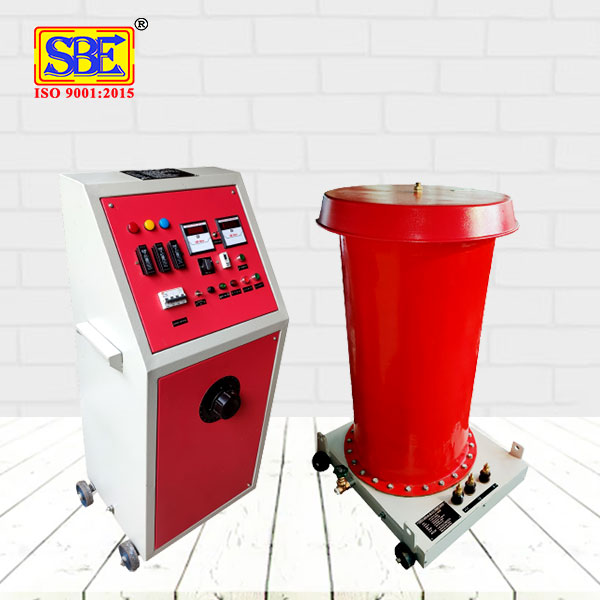
AC High Voltage Testers are often used to evaluate the efficiency of electrical equipment. To achieve the needed criteria for quality and dependability, the manufacturer performs main high voltage testing as part of the type and routine tests during production. These tests include measurements of partial discharge, switching impulse, lightning, and switching resistance, as well as insulation resistance.
While field testers used for maintenance have a much smaller range, this AC High Voltage Tester uses generators that can function within the capacity range of power up to 100 KV and beyond. Its goal is to assess insulation between primary and secondary, primary and earth, and secondary and earth.
How is High Voltage Testing Conducted?
High voltage testing is frequently carried out during installation tests or periodic maintenance. The withstand voltage test is one of the most often performed tests, which evaluates the transformer’s dielectric strength to determine whether it is enough for service or as part of maintenance programs to ensure that the equipment can resist high voltages while in operation.
Typically, an overvoltage is applied to the transformer’s mains and secondary, or secondary and ground, for 60 seconds. Suppose the measured current is less than the maximum allowable leakage current and does not induce insulation failure. In that case, the high voltage test is deemed successful, indicating that the product is safe to use under normal operating circumstances.
Advantages of AC High Voltage Testing:
Businesses in the high voltage technology industry must undertake routine inspections regularly to verify that their equipment is in good working order, condition, and safety. Authorised staff should do regular maintenance to check the equipment’s present condition. Equipment testing is critical for establishing the overall integrity of the machinery. These periodic checks are performed to avoid equipment or machine breakdowns, which might lead to considerable production losses. Some of India’s major AC High Voltage Tester Manufacturers propose frequent equipment checkups.
These machine assessments can also assist in identifying the worth of newly bought equipment before it is installed. Several industrial industries test the insulation of their equipment with high voltage before selling it to clients.
The dependability and quality of the equipment considerably influence the advantages of high-voltage insulation testing. The testing techniques offer dependable and effective insulation for any electrical equipment since the devices go through several testing steps to ensure perfect performance and appropriateness for use.
How do you use an AC high voltage tester?
-
You should wear proper PPE before handling any high-voltage equipment. A personal protective equipment kit has insulated gloves, eyeglasses, and suitable clothes.
-
Try to use a voltage tester that is free of any faults or damage. Also, check if the tester is clean and free of any pollutants
-
Make sure the high-voltage tester is appropriate for the voltage level of the system you’ll be evaluating. Using a tester with an incorrect voltage rating might be harmful.
-
You need to ensure the circuit is de-energized before you test it. For this, you can follow the standard lockout process and use a low-voltage tester or a phase tester.
-
Now, connect the AC high voltage tester to the circuit’s test points. You can refer to the manufacturer’s guidelines to start the testing.
-
Configure the tester using the required test settings. High-voltage testers may have several settings and choices.
-
High-voltage testers feature digital displays that show voltage levels. You can now note down the measurements.
-
Once the test is complete, unplug the high-voltage tester from the circuit. Make sure that all connections are removed properly.
Types of AC High Voltage Testers
Portable AC High Voltage Testers: These are lightweight, compact units that are easy to transport and use in the field. They are ideal for on-site testing of transformers, cables, and other electrical equipment.
Bench-Top AC High Voltage Testers: These testers are more robust and offer higher voltage outputs than portable units. They are commonly used in laboratories and manufacturing environments for testing smaller components like capacitors, connectors, and circuit boards.
Automated AC High Voltage Testers: These testers are integrated into automated testing systems for high-volume production environments. They can perform tests on multiple units simultaneously, increasing efficiency and throughput.
Custom AC High Voltage Testers: For specialized applications, custom-built testers can be designed to meet specific voltage, current, and safety requirements.
Applications of AC High Voltage Testers
In power plants and substations, AC high voltage testers are used to test transformers, switchgear, and cables.
AC high voltage testing is a standard part of the quality assurance process in the manufacturing of electrical equipment. It is used to test products such as motors, generators, capacitors, and insulators.
In the aerospace and defense sectors, AC high voltage testers are used to verify the insulation of wiring harnesses, avionics, and other critical components.
With the rise of electric vehicles (EVs), high-voltage testing has become important in the automotive industry. It is used to test the insulation of battery packs, charging systems, and other high-voltage components in EVs.
In the medical industry, voltage testers are used to test the insulation of components like MRI machines, X-ray equipment, and defibrillators.
Conclusion
AC high voltage testing is used to test electrical systems and components. These testers are used in different sectors such as manufacturing, power distribution, or other industries. The use of these AC high voltage testers helps prevent failures and protect individuals.